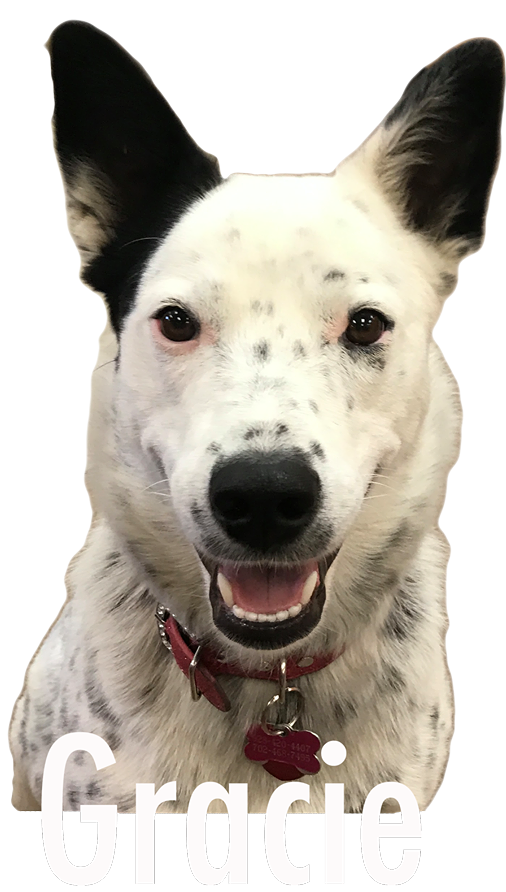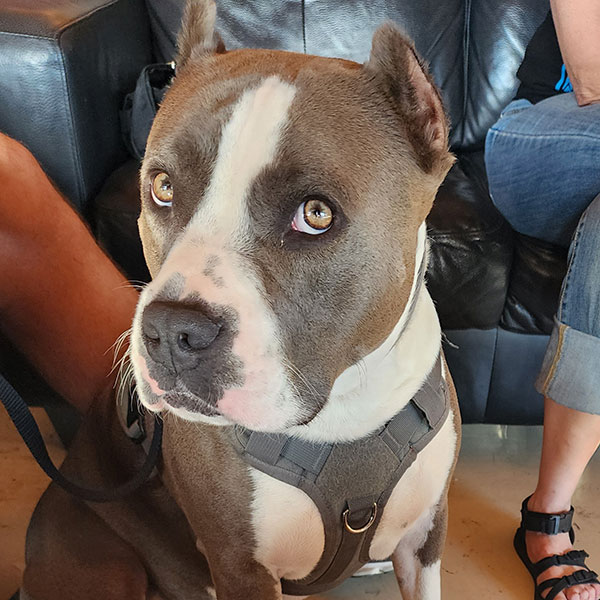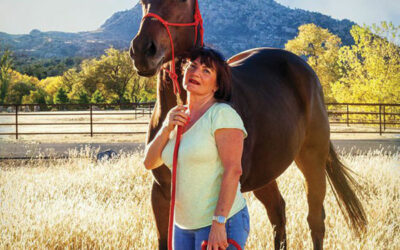“Not all disabilities are visible” declares a patch sewn to the vest of Bennett, the service dog of Nic Everhart. Nic and Bennett — a familiar sight around greater Tucson — are a striking, unusual pair: Nic is an Army veteran with noncombat PTSD; Bennett is a pit bull — not your average service breed. Their stories are equally unique and how they ended up together truly inspiring.
Between 20 and 30% of combat veterans suffer from PTSD annually, depending on where and when they deployed. Nic never deployed or saw combat, making his situation less common: his PTSD derives from the plummet in his physical and mental health after a shoulder injury sustained in a 2013 training exercise progressively worsened due to delayed and inadequate treatment. Owing to military healthcare’s red tape and restrictions it can take months, even years, to prove that an individual’s PTSD is service-related. Nic was ensnared in that bureaucracy for five years, during which chronic pain and the anguish of finding insufficient support from the military snowballed into anxiety, night terrors, depression, and constant irritability with spikes of rage. This convolution of torments led to a year of binge drinking and eventually a DUI. “I wasn’t an alcoholic,” he qualifies, “but I was self-medicating.”
Two major, disturbing incidents sparked his wakeup call: first, an attempted suicide in 2018; later, a spike of uncontrolled rage at his mom over a minor issue, after which his patiently stoic parent, who’d heard of service dogs for PTSD, urged him to consider it. Nic embarked on a six-month search to find a program, but nearby organizations had no ready dogs, while COVID prompted those farther to become local-only. He temporarily gave up in frustration, until two weeks spent caretaking his brother’s German Shepherd revived his determination.
Impressed by the dog’s steady ability to intuit and soothe his mood changes, Nic affirmed his need for a companion animal, this time reflecting on what would suit him most. His PTSD-fueled temperament issues got him researching breeds labeled aggressive. He wanted his future dog and he to relate to each other. He found the American Pit Bull Foundation (APBF) website where he learned of their shelter-to-service program Operation Sidekick, pairing vets with pit bull service dogs. This Charlotte, NC group saw an opportunity to transform 20 military suicides from PTSD daily, and 1000 pit bull euthanizings weekly into a hopeful community service.
After years of feeling broken, abandoned, and shamed, Nic felt a special kinship with pit bulls, who have been similarly stigmatized through ignorance, as most incidences of pit bull aggression stem from neglect and improper training. He immediately began communicating with founder/CEO Sara Ondrako who would coach him through the extensive, interview-heavy process. Pairing humans with service dogs is neither quick nor simple. As Nic says, “It’s not just, ‘Here’s a dog, here’s the commands, go forth’…”. It requires intensive vetting and training of both parties. Two months into this, Sara called him with the great news: they’d found a potential canine candidate. Nic travelled to Illinois to meet and hopefully bond with now one-year-old Bennett. If the bonding happened, they could launch training.
Bennett’s story is as unique as Nic’s — his rescue was not abuse-related. He was in a litter of 10 American Staffordshire Terrier puppies who all contracted parvo. Donated to a rescue organization by their breeder because unguaranteed treatment was financially impractical, seven survived with help from a partner veterinarian. They were donated to APBF, where Bennett was the sole qualifier for the service training program! Nic’s long wait was worth it: he found his “matching pair” dog in Bennett. They’re a perfect fit. Even Sara was amazed by how quickly they bonded, declaring them “…peas in a pod.” Bennett is a truly extraordinary dog, from his calm, watchful demeanor to the star-shaped pupils in his pale amber eyes. If you’re lucky enough to observe them in public, you may witness him resting 3 feet crossways to Nic in a crowd as a protective barrier, and periodically side-eyeing him watchfully for status checks.
Initially, Nic was apprehensive about being out with Bennett. While seeing eye dogs are familiar, psychiatric service dogs are more recent. He worried about having to face questions or challenges, but Bennett has helped Nic socially, bringing out his natural calm. He’s highly perceptive, adept at noticing the slightest cues of rising anxiety, from changes in breath rate or smell, to nervous ticks like leg-rubbing. Once cued, he employs a progression of tools to get Nic’s attention: nudges and nose “boops” against the leg; next, a quick yelp. If neither works, he’s trained in Deep pressure therapy (DPT), and will sit on Nic’s lap or — during night terrors — his chest.
Thanks to pit bull stigma, the pair do sometimes encounter disapproval, even occasional verbal abuse, and Nic gets trolled on social media by the vehemently prejudiced who assume pits are dangerous. But a properly-trained service terrier like Bennett is fully aware of how to behave on the job. Vest on, he’s a sober, hyper-aware medical service dog. Without it, he’s a 2-year-old, rambunctious puppy! Even without the vest, at home or the dog park, he snaps back into work mode if he sees Nic showing any signs of anxiety.
Today, Nic says that Bennett saved his life and sanity thanks to Operation Sidekick. His only complaint: Bennett gets more attention than him in public!
For more information on Operation Sidekick, visit https://apbf.dog/programs/os/













